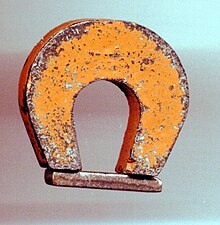What does Magnets mean?
Definitions for Magnets
mag·nets
This dictionary definitions page includes all the possible meanings, example usage and translations of the word Magnets.
Did you actually mean magnetic or magnetics?
Wikipedia
magnets
A magnet is a material or object that produces a magnetic field. This magnetic field is invisible but is responsible for the most notable property of a magnet: a force that pulls on other ferromagnetic materials, such as iron, steel, nickel, cobalt, etc. and attracts or repels other magnets. A permanent magnet is an object made from a material that is magnetized and creates its own persistent magnetic field. An everyday example is a refrigerator magnet used to hold notes on a refrigerator door. Materials that can be magnetized, which are also the ones that are strongly attracted to a magnet, are called ferromagnetic (or ferrimagnetic). These include the elements iron, nickel and cobalt and their alloys, some alloys of rare-earth metals, and some naturally occurring minerals such as lodestone. Although ferromagnetic (and ferrimagnetic) materials are the only ones attracted to a magnet strongly enough to be commonly considered magnetic, all other substances respond weakly to a magnetic field, by one of several other types of magnetism. Ferromagnetic materials can be divided into magnetically "soft" materials like annealed iron, which can be magnetized but do not tend to stay magnetized, and magnetically "hard" materials, which do. Permanent magnets are made from "hard" ferromagnetic materials such as alnico and ferrite that are subjected to special processing in a strong magnetic field during manufacture to align their internal microcrystalline structure, making them very hard to demagnetize. To demagnetize a saturated magnet, a certain magnetic field must be applied, and this threshold depends on coercivity of the respective material. "Hard" materials have high coercivity, whereas "soft" materials have low coercivity. The overall strength of a magnet is measured by its magnetic moment or, alternatively, the total magnetic flux it produces. The local strength of magnetism in a material is measured by its magnetization. An electromagnet is made from a coil of wire that acts as a magnet when an electric current passes through it but stops being a magnet when the current stops. Often, the coil is wrapped around a core of "soft" ferromagnetic material such as mild steel, which greatly enhances the magnetic field produced by the coil.
Wikidata
Magnets
Magnets was The Vapors' second album, released in 1981.
Editors Contribution
magnets
Plural form of magnet.
Magnets are used in a variety of instruments for various purposes.
Submitted by MaryC on January 8, 2016
Numerology
Chaldean Numerology
The numerical value of Magnets in Chaldean Numerology is: 7
Pythagorean Numerology
The numerical value of Magnets in Pythagorean Numerology is: 7
Examples of Magnets in a Sentence
I am very concerned about the magnets that draw people to the United States, we arrest people and they flat out tell us that' We gave ourselves up because we know you're going to release us.'.
Chinese permanent magnet producers get raw materials at 25% below the price I can get them, to reach a level playing field either the EU should compensate for this gap, or should consider penalties on the import of magnets. I personally would prefer the first option.
Awareness is the main thing, i think people just aren't aware that something so seemingly harmless could actually be damaging. I think people are probably more aware that, for example, batteries contain chemicals that can damage the gut very substantially, but magnets seem very innocuous objects.
Guantanamo continues to be one of the key magnets for jihadi recruitment.
They need to cut off magnets that draw illegal economic migrants.
Popularity rank by frequency of use
Translations for Magnets
From our Multilingual Translation Dictionary
- المغناطيسArabic
Get even more translations for Magnets »
Translation
Find a translation for the Magnets definition in other languages:
Select another language:
- - Select -
- 简体中文 (Chinese - Simplified)
- 繁體中文 (Chinese - Traditional)
- Español (Spanish)
- Esperanto (Esperanto)
- 日本語 (Japanese)
- Português (Portuguese)
- Deutsch (German)
- العربية (Arabic)
- Français (French)
- Русский (Russian)
- ಕನ್ನಡ (Kannada)
- 한국어 (Korean)
- עברית (Hebrew)
- Gaeilge (Irish)
- Українська (Ukrainian)
- اردو (Urdu)
- Magyar (Hungarian)
- मानक हिन्दी (Hindi)
- Indonesia (Indonesian)
- Italiano (Italian)
- தமிழ் (Tamil)
- Türkçe (Turkish)
- తెలుగు (Telugu)
- ภาษาไทย (Thai)
- Tiếng Việt (Vietnamese)
- Čeština (Czech)
- Polski (Polish)
- Bahasa Indonesia (Indonesian)
- Românește (Romanian)
- Nederlands (Dutch)
- Ελληνικά (Greek)
- Latinum (Latin)
- Svenska (Swedish)
- Dansk (Danish)
- Suomi (Finnish)
- فارسی (Persian)
- ייִדיש (Yiddish)
- հայերեն (Armenian)
- Norsk (Norwegian)
- English (English)
Word of the Day
Would you like us to send you a FREE new word definition delivered to your inbox daily?
Citation
Use the citation below to add this definition to your bibliography:
Style:MLAChicagoAPA
"Magnets." Definitions.net. STANDS4 LLC, 2025. Web. 22 Feb. 2025. <https://www.definitions.net/definition/Magnets>.







Discuss these Magnets definitions with the community:
Report Comment
We're doing our best to make sure our content is useful, accurate and safe.
If by any chance you spot an inappropriate comment while navigating through our website please use this form to let us know, and we'll take care of it shortly.
Attachment
You need to be logged in to favorite.
Log In